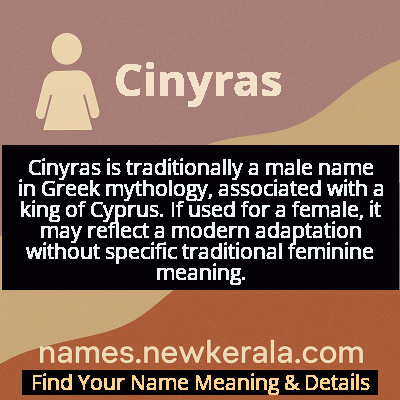Cinyras Name Meaning & Details
Origin, Popularity, Numerology Analysis & Name Meaning of Cinyras
Discover the origin, meaning, and cultural significance of the name CINYRAS. Delve into its historical roots and explore the lasting impact it has had on communities and traditions.
Name
Cinyras
Gender
Female
Origin
Greek
Lucky Number
8
Meaning of the Name - Cinyras
Cinyras is traditionally a male name in Greek mythology, associated with a king of Cyprus. If used for a female, it may reflect a modern adaptation without specific traditional feminine meaning.
Cinyras - Complete Numerology Analysis
Your Numerology Number
Based on Pythagorean Numerology System
Ruling Planet
Saturn
Positive Nature
Ambitious, efficient, realistic, and authoritative.
Negative Traits
Materialistic, stressed, confrontational, and can be overly ambitious.
Lucky Colours
Dark blue, black.
Lucky Days
Saturday.
Lucky Stones
Blue sapphire, amethyst.
Harmony Numbers
2, 4, 6.
Best Suited Professions
Business leaders, managers, financial services, law enforcement.
What People Like About You
Leadership, determination, organizational skills.
Famous People Named Cinyras
Cinyras of Cyprus
Mythological King and Priest
Founded the cult of Aphrodite at Paphos and established her worship in Cyprus
Cinyras (Historical Figure)
Ancient Cypriot Ruler
Ruled the city-kingdom of Paphos and maintained religious traditions connected to Aphrodite worship
Cinyras the Musician
Mythical Musician
Renowned for musical contests and credited with inventing various musical instruments and religious hymns
Name Variations & International Equivalents
Click on blue names to explore their detailed meanings. Gray names with will be available soon.
Cultural & Historical Significance
The cultural impact of Cinyras persisted through classical antiquity, with numerous Greek and Roman authors referencing his role in establishing Aphrodite's cult. His story embodies important themes of religious innovation, cultural transmission, and the relationship between political power and religious authority. The enduring legacy of Cinyras in classical literature and art demonstrates how mythological figures could shape cultural identity and religious practice across centuries. His narrative also reflects the complex historical relationships between Cyprus and mainland Greece, as well as the island's role as a cultural intermediary between the Greek world and the civilizations of the Eastern Mediterranean.
Extended Personality Analysis
Those bearing the name Cinyras typically exhibit a remarkable blend of spiritual depth and practical leadership abilities. They often possess natural authority that commands respect, combined with artistic sensitivity that enables creative expression. These individuals tend to be deeply devoted to their principles and causes, showing unwavering commitment to whatever they consider sacred or fundamentally important. Their leadership style often involves inspiring others through vision and dedication rather than coercion, reflecting the mythological Cinyras's role as both king and high priest who guided his people in religious matters.
The creative aspect of the Cinyras personality manifests in various artistic pursuits, whether music, poetry, visual arts, or other forms of expression. They have an innate appreciation for beauty and harmony that influences their choices in all aspects of life. While they can be ambitious and determined in pursuing their goals, they typically maintain a compassionate and nurturing approach to relationships. The complex mythological background of the name also suggests individuals who may face significant personal challenges but possess the resilience to transform difficulties into sources of strength and wisdom. Their ability to bridge different worlds—whether spiritual and material, artistic and practical, or traditional and innovative—makes them effective mediators and cultural synthesizers in their communities.
Modern Usage & Popularity
In contemporary naming practices, Cinyras remains an extraordinarily rare choice, primarily confined to academic families, mythology enthusiasts, and those with specific connections to Cypriot heritage. The name's complexity and unfamiliar pronunciation present significant barriers to widespread adoption, though this very rarity appeals to parents seeking truly distinctive classical names. Modern usage often focuses on the name's deep historical roots and literary associations rather than its religious connotations, with parents appreciating its connection to ancient cultural traditions. There has been a minor but noticeable increase in usage within Greek and Cypriot diaspora communities, particularly in North America and Australia, where parents often seek names that honor ancestral heritage while standing apart from more common Greek names like Alexander or Nicholas. The name's association with artistic creativity and spiritual leadership makes it appealing to parents in creative or academic professions. Despite its obscurity, Cinyras benefits from the broader trend of reviving ancient mythological names, though it remains far less common than names like Athena, Orion, or Persephone that have achieved more mainstream recognition.
Symbolic & Spiritual Meanings
Symbolically, Cinyras represents the profound connection between religious devotion and cultural foundation, embodying the concept that spiritual practices can shape civilizational identity. The name carries meanings of sacred kingship, where political authority and religious leadership merge into a single role of cultural stewardship. It symbolizes the power of artistic expression as a form of worship, connecting musical innovation with divine service. Cinyras also represents cultural synthesis and the fruitful merging of different traditions, reflecting Cyprus's historical role as a meeting point between Greek and Eastern civilizations. The tragic elements in his mythology add symbolic depth regarding the complexities of family relationships, the consequences of broken vows, and the transformative power of suffering. Metaphorically, Cinyras signifies the bridge between human creativity and divine inspiration, between established tradition and religious innovation, and between personal devotion and institutional religion. The name ultimately symbolizes how individual passion and commitment can create lasting cultural institutions that endure for millennia, transforming personal spiritual experiences into collective religious practices that define civilizations.

